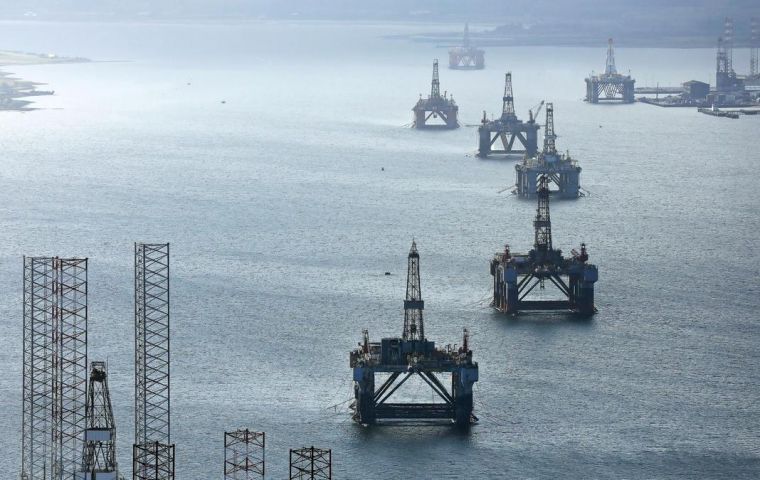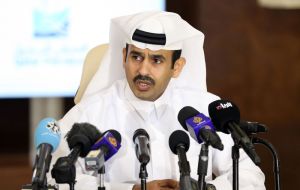MercoPress. South Atlantic News Agency
Qatar exits OPEC on January to concentrate as world's largest LNG exporter
 The surprise decision to exit OPEC in January was not driven by politics underlined Minister of State for Energy Affairs Saad al-Kaabi
The surprise decision to exit OPEC in January was not driven by politics underlined Minister of State for Energy Affairs Saad al-Kaabi  “We are not saying we are going to get out of the oil business but it is controlled by an organization managed by a country,” al-Kaabi said.
“We are not saying we are going to get out of the oil business but it is controlled by an organization managed by a country,” al-Kaabi said.  “It could signal a historic turning point of the organization towards Russia, Saudi Arabia and the US,” said Algeria’s ex energy minister Chakib Khelil
“It could signal a historic turning point of the organization towards Russia, Saudi Arabia and the US,” said Algeria’s ex energy minister Chakib Khelil Qatar said it will quit OPEC to focus on gas in a swipe at Saudi Arabia, the de facto leader of the oil exporting group which is trying to show unity in tackling an oil price slide. Doha, one of OPEC’s smallest oil producers but the world’s biggest liquefied natural gas (LNG) exporter, is embroiled in a row with OPEC members Saudi Arabia and the United Arab Emirates.
It said the surprise decision to exit OPEC, which has 15 members including Qatar, in January was not driven by politics and it did not name Saudi Arabia, but Minister of State for Energy Affairs Saad al-Kaabi said:
“We are not saying we are going to get out of the oil business but it is controlled by an organization managed by a country.”
Qatar would attend an OPEC meeting scheduled for Thursday and Friday in Vienna and would abide by its commitments, he said, adding that Doha would focus on its gas potential.
This was because it was not practical “to put efforts and resources and time in an organization that we are a very small player in and I don’t have a say in what happens,” he added.
OPEC members Saudi Arabia and the United Arab Emirates, and fellow Arab states Bahrain and Egypt, have imposed a political and economic boycott on Qatar since June 2017, accusing it of supporting terrorism, which Doha denies.
Qatar’s former prime minister, Sheikh Hamad bin Jassim al-Thani, said on Twitter that OPEC “is only used for purposes that hurt our national interests”.
The United Arab Emirates said Doha’s decision was a reflection of its declining influence.
“The political aspect of Qatar’s decision to quit OPEC is an admission of the decline of its role and influence in light of its political isolation,” Anwar Gargash, UAE minister of state for foreign affairs, said on Twitter.
OPEC’s loss of a long-standing member undermines a bid to show a united front before a meeting that is expected to back a supply cut to shore up prices. Benchmark Brent is trading at around US$ 62 a barrel, down from more than US$ 86 in October.
“They are not a big producer, but have played a big part in (OPEC’s) history,” one OPEC source said.
It highlights the growing dominance over policy making in the oil market of Saudi Arabia, Russia and the United States, the world’s top three oil producers which together account for more than a third of global output.
Riyadh and Moscow have been increasingly deciding output policies together, under pressure from U.S. President Donald Trump on OPEC to bring down prices.
“It could signal a historic turning point of the organization towards Russia, Saudi Arabia and the United States,” said Algeria’s former energy minister and OPEC chairman, Chakib Khelil, commenting on Qatar’s move.
He said Doha’s exit would have a “psychological impact” because of the row with Riyadh and could prove “an example to be followed by other members in the wake of unilateral decisions of Saudi Arabia in the recent past.”
Qatar, which Al-Kaabi said had been a member of OPEC for 57 years, has oil output of just 600,000 barrels per day (bpd), compared with Saudi Arabia’s 11 million bpd.
But Doha is an influential player in the global LNG market with annual production of 77 million tons per year, based on its huge reserves in the Gulf.
Al-Kaabi, who is heading Qatar’s OPEC delegation, said the decision was part of a long-term strategy and the country’s plans to develop its gas industry and increase LNG output to 110 million tons by 2024.




Top Comments
Disclaimer & comment rulesCommenting for this story is now closed.
If you have a Facebook account, become a fan and comment on our Facebook Page!